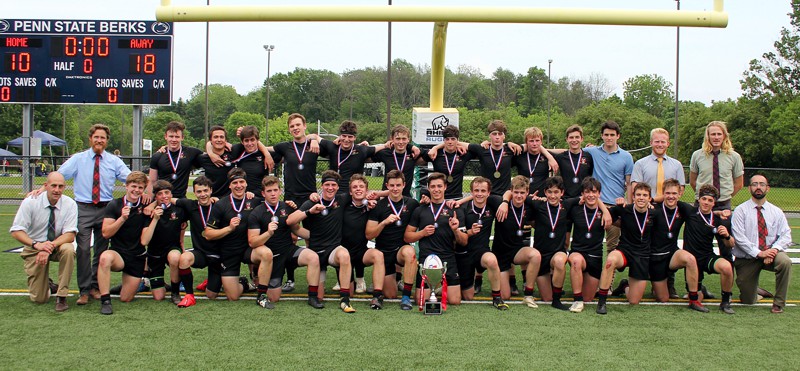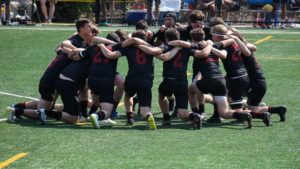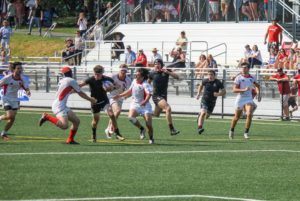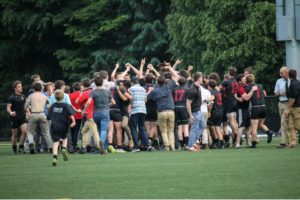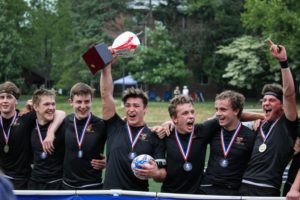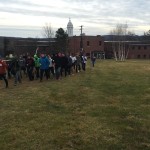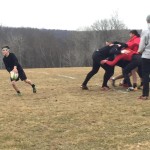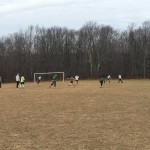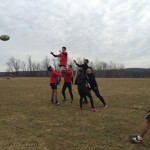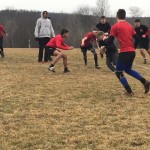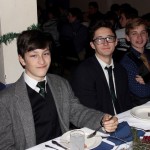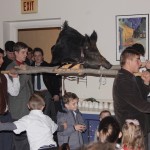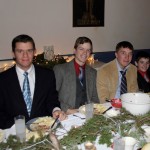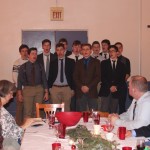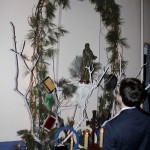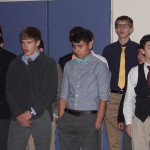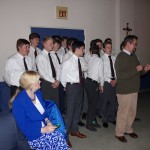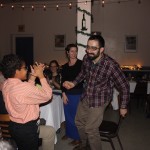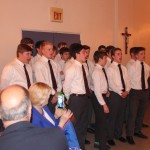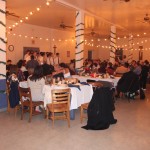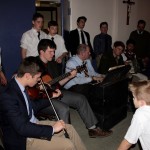by Luke Culley, Headmaster
Reverend Fathers, Faculty, Families, Students, Alumni, and Graduates:
I remember watching this class when they were freshmen, only days after their arrival in what was then our school in a place situated in the Pocono mountains called Pine Hill. I stood watching them from the porch of the cabin where I lived as they assembled around a rock on the field below and one or other member of their class would step up onto the rock and begin addressing his new classmates, soon to be friends. First I remember John Bateman step onto the rock to preach. And then Max Valentine decided it was his turn so he would take his place on the rock and so it went. After watching this for a while, I turned to Ben Strong (our Math and Physics teacher as well as dormfather at the time) and said that I would give a lot to know what it was they were talking about so earnestly and even formally. I could only imagine. This was only the second or third day of their freshman year and they were already forming themselves into some kind of politic body and, at least I imagined it this way at the time, making plans to improve the place. I remember telling Ben: “this is going to be a special class.”
By the time they were juniors, their manifold gifts of intelligence, strength of character, athletic ability, and – let’s face it – all around coolness, began to take shape in not so surprising and not always so pleasant ways. They knew that they were upper-formers now, leaders of the student body, and they wanted to share their ideas, and respectfully, of course, disagree. Were they a bit cocky at times? Well, YES. But we knew that underneath all that they were really good boys who were growing, doing, and thinking with all their might and main. These were good boys, but they were as yet unfinished. Like a rock under the artist’s chisel, they were still taking shape.
But something began to happen to them between their junior and senior year. Only they could tell us what it was exactly. Whatever it was, I doubt it happened all at once. But it did begin with something decisive: almost as if they had re-assembled around some other rock to re-assess themselves and their role in the school. When they came back to be seniors, they were ready to serve, they were ready to learn how to be true leaders: they were ready to be something remarkable: young men who are constantly trying to see the good of the whole and to serve it well, whether that whole was the boys in their room, the orderliness and cleanliness of the kitchen, the soundness and fun of weekend activities. These young men strove to learn from their head dormthather Jonathan Kuplack, from their coaches, from their teachers, and from one another how they could improve in each of the areas of their lives here — and in the end, they truly accomplished what I like to think they were already dreaming about and planning in those first days of their freshman year around a rock. They did make this a better school. We are proud of them, as I know you are and ought to be. But that expression doesn’t capture quite what I mean. A better way to put it, perhaps, is we are grateful for them and even astonished at them. We stand in admiration of what God has wrought in these young lads during these four years at this school. And my sincere hope is that they too stand in astonishment at what God has wrought in them as they worked well with all the grace God gave them to work with.
It is true that their senior year was cut short. There was no rugby season. No chance to show that this year would be the best season in Saint Gregory’s history. No final goodbyes to their room-mates, over whom they took such excellent care. And worst of all, no thesis defenses. Just kidding. That’s the one thing I think most of them don’t regret missing out on.
But their losses were great: there was no Saint Francis Pilgrimage. All of this is very sad for them, for their teachers, and for the whole school. But when I reflect on this year, I believe that what they are left with is no small thing. For God accomplishes all things well and for God a part can become the whole. In this unfinished year, this year that was cut off in an untimely fashion, I can say with complete confidence that they achieved a knowledge that is an experience of the whole of reality. Not that they now know the whole of reality, far from it, but that they have received the whole of reality that our school can give to young men of their age. I believe this. And I also believe that their sudden exit from the doors of our school, when neither they or we realized at the time that the exit was as final as it actually was, has afforded them a hard lesson from which they can learn much indeed. Their senior year was not finished. The fullness of their Saint Gregory’s experience was incomplete. They did not go on a pilgrimage — and yet, and yet… life is a pilgrimage or rather many pilgrimages and all lives end unfinished. To begin to reflect on this rude experience of loss, of being cut off from what is expected, of what is rightly your own, of the fulfillment of all you have striven for, we might turn to some of the greatest unfinished works of man: Mozart’s Requiem Mass (which they listened to in solitude but also in estranged company with the rest of their their schoolmates in this period of Covid exile), a mass composed while Mozart was dying. He did not finish it. Why? Why did God not give him the strength to finish what was so clearly one of the greatest musical achievements of man composed for the honor and glory of God himself? The great German poet Rainer Maria Rilke mused about an incomplete sculpture of the god Apollo. Gazing at what remained of this headless stone torso, Rilke writes:
We cannot know his legendary head
with eyes like ripening fruit. And yet his torso
is still suffused with brilliance from inside,
like a lamp, in which his gaze, now turned to low,
gleams in all its power. Otherwise
the curved breast could not dazzle you so, nor could
a smile run through the placid hips and thighs
to that dark center where procreation flared.
Otherwise this stone would seem defaced
beneath the translucent cascade of the shoulders
and would not glisten like a wild beast’s fur:
would not, from all the borders of itself,
burst like a star: for here there is no place
that does not see you. You must change your life.
For Rilke the fragment shines in every part in a way that is somehow more powerful than if it were whole. And for him the effect is transformative. Every inch of this unfinished stone cries out to him through the brilliance of a resplendent smile unseen but felt everywhere: You must change your life.
Suddenly these young men found themselves at home, with a pile of essays to write, music to listen to, sonnets to compose, with instructions and encouragement coming from a voice far away but appearing to them weekly on computer screens. This was all good work. But it was definitely not their school. Suddenly they were out of their element. Trying to be who they have learned to be in the company of one another and their teachers and their usual surroundings and events but without one another, without any of these supports. They had become fragments of their own experience, of their own knowledge. Dis-oriented fragments I imagine. And yet bearing within them the resplendent smile of the whole. This uncomfortable, painful, but I dare say illuminating experience of being a fragment and struggling to make of it a whole is the work that each of you will now pursue for the rest of your lives. There will be a pilgrimage and this will be the quest of your pilgrimage. How to take what you know, what has been revealed to you, and revealed even more urgently, more clearly now that you are separated from it. How to take this in hand and translate it, shape it into action for every new circumstance of your life. You must change your life. Because you have already been changed in so many extraordinary ways. This will not be easy, but unlike most Saint Gregory’s seniors who have sat where you sit now, you already know this crucial truth.
Your class began, as I remember, around a rock. (Do any of you remember this?) And it continued to gather around a rock. A rock that took many forms: Countless conversations, class trips into mountains and down rivers, playing on the rugby field and in the IPL league and everywhere else, finding your voice by telling jokes to friends, by giving speeches in rhetoric class, and by being leaders of your room, of your areas, and of the school. When I first taught you in Church History I remember that your class always seemed to be laughing or smiling about something. Now, I know it was probably some comical face Francis Rataj was making, that perfect angel. Or was it James? I still don’t know.
In Humanities you were still full of mirth but ready to tackle serious books and serious conversations. I did not participate in your weekly seminar with Dr. Lefler every tuesday night but I loved to look in on them. It was wonderful to see: the beauty of young men conversing with a wise teacher. The resplendent smile of wisdom is what you have gained here. In your work, in your play, in your contemplation, in your laughter, in your prayer you have been made translucent to a wisdom that will suffuse the rest of your days if you choose to deepen it through memory, inquiry, and prayer. And you have found that the proper home for wisdom is friendship: friendship not only with each other, but friendship with all the students, and even with your teachers, friendship with your parents and your family, friendship with all of Creation, friendship with God. And you know this because you know that it is by giving gifts to one another for something larger than yourselves, like a rugby game, like a class discussion, like a casino night, like a 5 course meal for the freshmen, like a school, that you become more than yourselves. In giving, you are given back, magnified and multiplied. It is the resplendent truth of this rock that you stand around now. And we are all honored to be able to stand here with you.


